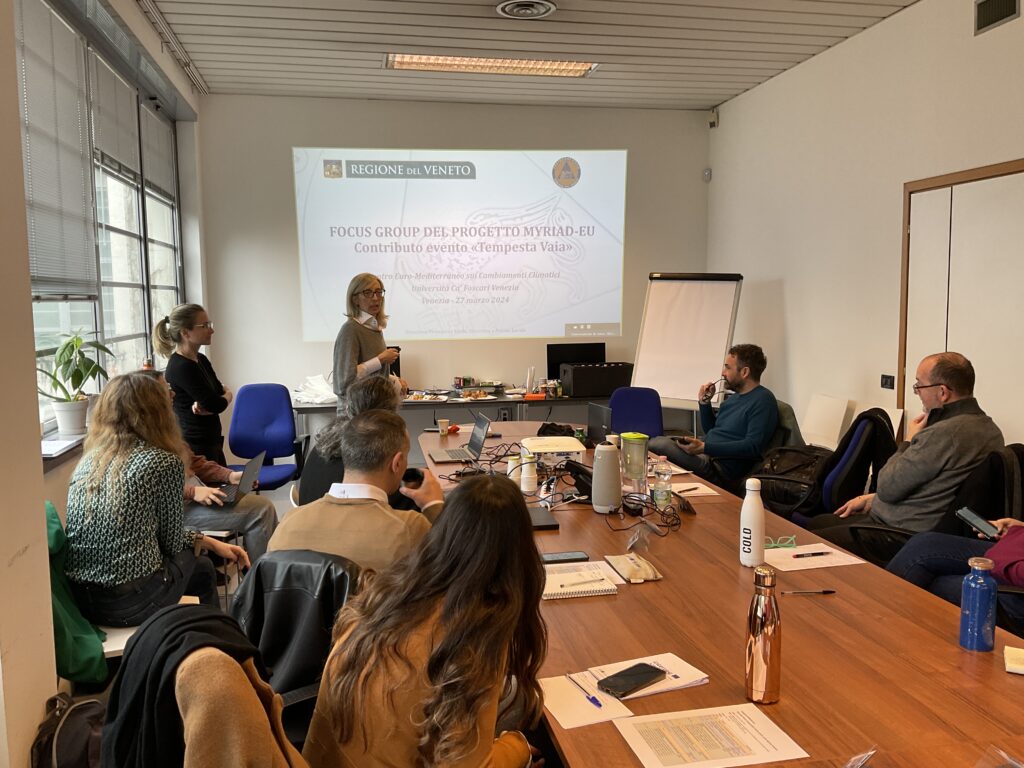
Innovative Multi-Hazard Risk Assessment and Management Takes Center Stage at the Second Focus Group for the Veneto Region
Veneto, Italy – Researchers, practitioners, and policymakers recently met at the Second Focus Group (FG2) of the MYRIAD-EU project to discuss new ways to assess and manage multiple hazards and risks in the Veneto Region Pilot. The event, held both in-person and online, gathered key stakeholders to tackle climate and disaster risks and discuss risk reduction and adaptation options.
A representative of the Veneto Region Environment and Ecological Transition Office was invited to present the preliminary Regional Strategy for Adaptation to Climate Change (SRACC). This strategy, developed with help from Regional Agency for Environmental Protection and Prevention of the Veneto (ARPAV), Ca’ Foscari University of Venice (UNIVE), Venice Architecture University (IUAV), and Centro Euro-Mediterraneo sui Cambiamenti Climatici (CMCC), aims to provide the region with effective tools and guidelines for adapting to climate change using a multi-hazard risk approach.
Interactive Sessions Driving Innovation
The FG2 included two main engaging sessions:
1. Multi-Hazard Risk Analysis, where:
– Davide Mauro Ferrario showed how MYRIAD-HESA, an approach to identify multi-hazard footprints at global scale, has been adapted to the scale of the Veneto Region, highlighting trends and locations of multi-hazard events under various climate projections.
– Dr. Jacopo Furlanetto and Diep Nguyen presented an approach to assess multi-hazard risk on ecosystems and river water quality. Challenges in data availability were discussed with stakeholders, setting the foundations for the development of a dedicated Machine Learning model.
2. From Risk Assessment to Risk Management, where:
– Dr. Veronica Casartelli facilitated a collaborative discussion on the 2018 Vaia storm, building the foundations for the development of a storyline around this past event and exploring plausible future scenarios to identify DRM pathways.
Active Stakeholder Engagement
Stakeholders actively participated, providing valuable insights and feedback. Representatives from ARPAV and Veneto Region along with sector-specific stakeholders such as Veneto Motorway Concession, Italian Centre for River Restoration and ViverAcqua Veneto openly shared their knowledge on and direct experience of the Vaia storm, providing key information to improve understanding of the event itself, highlight major cross-sectoral challenges, and assess the impact of risk reduction measures implemented during and after the event. This collaboration emphasises the importance of combining local knowledge with results from advanced scientific methods to inform effective disaster risk management pathways.
Future Steps
As the MYRIAD-EU project continues, the next steps include online meetings with stakeholders to better incorporate their feedback into the methodologies and develop forward-looking disaster risk management pathways. These efforts will be showcased at the Final Pilot Workshop for the Veneto Region in February 2025.
FG2 has set a new standard for innovative and collaborative approaches to multi-hazard risk assessment, making a significant step towards building climate resilience in the Veneto Region. Both researchers and policymakers are set to benefit from the insights and tools developed through this pioneering initiative.
